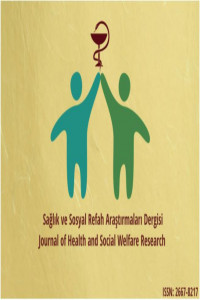YAŞLI TURİSTLERİN TURİZM ALGILARININ BELİRLENMESİ
Bu araştırma, 50 yaş üstü turistlerin turizm algılarını belirlemek amacıyla betimsel/tanımlayıcı bir çalışma olarak planlanmıştır. Araştırmanın evrenini Aralık 2021-Mart 2022 tarihleri arasında Sivas'ta faaliyet gösteren turizm acentelerine başvuran 50 yaş üstü turistler oluşturmaktadır. Araştırmaya 148 kişi katılmıştır. Veri toplama formu ve Turizm Algı Ölçeği katılımcılara yüz yüze uygulanmıştır. Buna göre 50 yaş üstü turistlerin çoğunluğu kadın (%71,6), evli (%64,9), 50-64 yaş grubunda (%70,9), çoğunluk daha önce turistik gezilere katılmış, yarısından fazlası ev hanımı (51.4) olduğu belirlenmiştir. Ölçek puanlarına bakıldığında turizm algısı ölçek puanının 62,24±6,87 olduğu ve yaşlı turistlerin turizm algılarının düşük olduğu görülmüştür.
Anahtar Kelimeler:
turizm algısı, yaşlanma, üçüncü yaş, sağlık turizmi
DETERMINATION OF TOURISM PERCEPTIONS OF OLD AGE TOURISTS
This research was planned as a descriptive study in order to determine the tourism perceptions of tourists over the age of 50. The population of the study consisted of tourists over the age of 50 who applied to tourism agencies operating in Sivas between December 2021 and March 2022. 148 people participated in the research. Data collection form and Tourism Perception Scale were applied face to face to the participants. According to this, the majority of the tourists over the age of 50 are women (71.6%), they are married (64.9%) in terms of marital status, they are in the 50-64 age group (70.9%), the majority of them have participated in touristic trips before, more than half of them are housewives. 51.4) was determined. Considering the scale scores, it was seen that the tourism perception scale score was 62.24 ± 6.87 and the tourism perceptions were low
Keywords:
tourism perception, aging, third age, health tourism,
___
- KAYNAKÇA İçöz, Onur (2009). Sağlık Turizmi Kapsamında Medikal (Tıbbi) Turizm ve Türkiye’nin Olanakları. Journal of Yaşar University, 4(14): 2257-2279.
- Doğanay, Hayati ve Zaman, Serhat (2021). Türkiye Turizm Coğrafyası. Ankara: Pegem Akademi Yayıncılık.
- Hunter- Jones, Philippa, Blackburn, A(2007). Understanding the relationship between holiday taking and self –assessed health :An Exploratory syudy of senior tourısm. International Journal of Yasar University, 4(14),2257-2279.
- Gürcü, M ve Tengilimoğlu, D. (2016). Health Tourism –Based Destination Markting, (Ed. Ahmer Bayraktar and Can Uslay) ,Strategic Place Branding Methodologies and Theory for Tourist Attraction, USA:Hershey, s.(308-331).
- Möller C, Weiermair K and Wintersberger, E. (2007). The changing travel behaviour of Austria‟s ageing population and its impact on tourism. Tourism Review, 62 (3/4), 15- 20.
- Diekmann A, Vincent M, Isabella B (2020). The holiday practices of seniors and their implications for social tourism: A Wallonian perspective. Annals of Tourism Research, 85 (2020): 103096.
- Ayaz, N., Artuger, S. and Turkmen, F. (2009). A field study to determine the tourism perspectives of the local people in the historical Zela (Zile) district. Journal of the Faculty of Commerce and Tourism Education, (2), 103-124. Kervankıran, İ. and Bulut, E. (2015). How do local people evaluate the development and effects of tourism in Antalya? Turkish Journal of Geography, 65, 35-45.
- Hume, L. F., & Demicco, F. J. (2007). Bringing hotels to healthcare. Journal of Quality Assurance in Hospitality & Tourism, 8(1), 75-84. doi: 10.1300/J162v08n01_04.
- Özsarı, S.H & Karatana, Ö. (2013). The Situation of Turkey in terms of Health Tourism. Journal of Kartal Training & Research Hospital/Kartal Training and Research Hospital Medical Journal, 24(2). 136-144.
- Erkılıç, Eren (2019). Yerel halkın turizm algısı ve turizmin gelişimine yönelik tutumları: Rize örneği. International Journal of Contemporary Tourism Research, 3(1), 66-82
- Gümüş, Nevzat, and Salman Özüpekçe (2009). Foça’da turizmin ekonomik, sosyal, kültürel ve çevresel etkilerine yönelik yerel halkın görüşleri. Uluslararası İnsan Bilimleri Dergisi, 6.2, 398-417.
- Güneş, E ve Alagöz, G (2018). ‘‘Yerel Halkın Turizm Algısı: Erzincan’da bir Araştırma’’. Iğdır Üniversitesi Sosyal Bilimler Dergisi, (15), 409-442.
- You, Xinran and O'leary Joseph T. (2000). Age and Cohort Effects: An Examination of Older Japanese Travelers. Journal of Travel & Tourism Marketing, 9:1-2, 21-42.
- Horneman, Louise, Carter, R. W., Wei, S., & Ruys, Hein. (2002). Profiling the Senior Traveler: An Australian Perspective. Journal of Travel Research, 41(1), 23–37.
- World Health Organisation. (1974). World Health Organisation. Retrieved December 5, 2020, from https://www.euro.who.int/en/health-topics/health-emergencies/coronavirus-covid-19/weekly-surveillance-report, 2020, (eri%3C015F%3Eim tarihi: 24.07.2020).
- Yayın Aralığı: Yılda 2 Sayı
- Başlangıç: 2018
- Yayıncı: Haşim ÇAPAR
Sayıdaki Diğer Makaleler
Ömer Faruk GÜLTEKİN, Ömer Selçuk EMSEN
ÖRGÜTSEL STRESİN MUTLULUĞA VE ÇALIŞAN PERFORMANSINA ETKİSİ
Saadet KARAKUŞ, Fatma KANTAS YİLMAZ
KORUYUCU AĞIZ VE DİŞ SAĞLIĞI HİZMETLERİNİN SUNUMU: TÜRKİYE VE BAZI ÜLKELERDE ÖRNEK UYGULAMALAR
Ayşegül DOĞAN, Serap DURUKAN KÖSE
TÜRKİYE’DE PATATES ÜRETİM KARARININ BELİRLEYİCİLERİ: ARDL SINIR TESTİ YAKLAŞIMI
HASTA GÜVENLİĞİ KÜLTÜRÜ: BİR EĞİTİM ARAŞTIRMA HASTANESİ ÖRNEĞİ
Arzu BULUT, Halil ŞENGÜL, Züleyha ÇELİK
TOPLUMUN KORUYUCU AŞILARLA İLGİLİ TUTUM VE DAVRANIŞLARI: İSTANBUL İLİ ÖRNEĞİ
Yenidoğan Sağlık Göstergesi Olarak Doğum Kilosu
Hakan DEĞERLİ, Hasan Giray ANKARA
